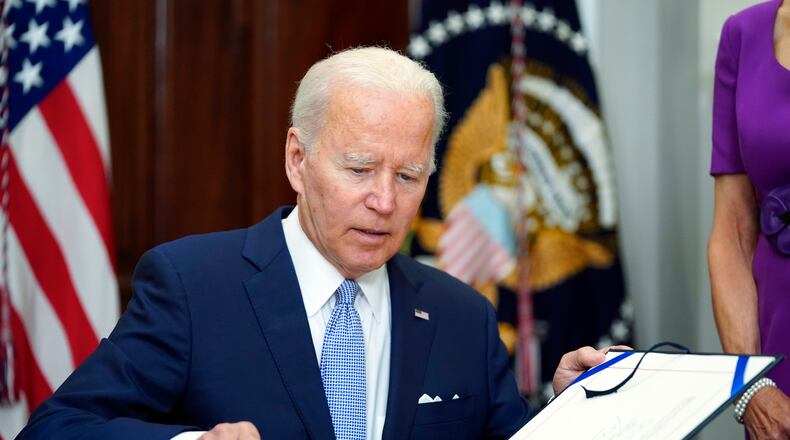Staff and wire reports
WASHINGTON — President Joe Biden announced Thursday that hundreds of thousands of immigrants brought to the U.S. illegally as children will now be able to apply for Medicaid and the Affordable Care Act’s health insurance exchanges.
The action will allow participants in the Obama-era Deferred Action for Childhood Arrivals program, or DACA, to access government-funded health insurance programs. “They’re American in every way except for on paper,” Biden said in a video released on his Twitter page. “We need to give Dreamers the opportunities and support they deserve.”
The move is likely to generate significant pushback from conservative leaders of states such as Georgia, which have been critical of the Biden administration’s response to migrants who enter the U.S. illegally. Since February 2021, Georgia’s attorney general has taken several actions in consort with other Republican states to halt what it’s called Biden’s “dangerous” immigration policies, including calls for the resignation of Alejandro N. Mayorkas, the homeland security secretary.
Georgia also remains one of 11 states that have chosen not to fully expand Medicaid. While the federal government provides funding and guidelines for Medicaid, the program is administered by the states.
Neither the office of the Georgia attorney general nor that of Gov. Brian Kemp responded to requests for comment.
Then-President Barack Obama launched the 2012 DACA initiative to shield from deportation immigrants who were brought to the U.S. illegally by their parents as young children and to allow them to work legally in the country. However, the immigrants, known as “Dreamers,” were still ineligible for government-subsidized health insurance programs because they did not meet the definition for having “lawful presence” in the U.S. Biden’s Department of Health and Human Services will aim to change that by the end of the month.
The White House action comes as the DACA program is in legal peril and the number of people eligible under the program is shrinking.
An estimated 580,000 people were still enrolled in DACA at the end of last year, according to U.S. Citizenship and Immigration Services. That number is down from previous years. In Georgia, the number of DACA recipients is 19,300, according to the most recent estimates from the Migration Policy Institute.
Local immigrant advocates cheered Thursday’s White House announcement, even as they acknowledged frustration with the President’Biden’s track record on immigration, which has included a number of restrictive border control measures.
“Today’s announcement by theBiden Administration is exactly the kind of action needed. Despite plenty of lack of progress on immigration policy, it’s worth celebrating this announcement,” said Jerry Gonzalez, head of the Georgia Association of Latino Elected Officials and the GALEO Impact Fund. “We will continue to advocate for a path to citizenship for DACA and the many other undocumented immigrants who now call our nation home … The Biden Administration’s move is welcome movement forward.”
To qualify for DACA status, immigrants must have come to the country by age 16 and before June 2007. They must have studied in a U.S. school or served in the military, and lack any serious criminal record.
Court orders currently prevent the U.S. Department of Homeland Security from processing new applications. The DACA program has been mired in legal challenges for years, sinking enrollees in limbo as Congress has been unable to reach consensus on broader immigration reforms.
Jaime Rangel is familiar with that sense of limbo. A Georgia staffer with advocacy group FWD.us, Rangel is also a “Dreamer.”
“As congressional inaction to provide Dreamers with permanent protections continues and legal battles ensue, the peace of mind that we will have the tools needed to stay healthy, care for ourselves and our families, and continue contributing to the country we love is needed,” he said in a statement. “Myself and the more than 19,300 other DACA recipients in Georgia thank President Biden for taking this action and we look forward to the health benefits this will bring.”
DACA recipients can work legally and pay taxes, but they don’t have legal status and are denied many benefits available to U.S. citizens and foreigners living in the U.S.
In recent years, millions of people in the U.S. signed up for Medicaid, the program that provides health care coverage for the poorest Americans, during the COVID-19 pandemic. The government increased federal subsidies to drive down the cost of plans on the Affordable Care Act’s marketplace. As of last year, just 8% of Americans were without health insurance, according to HHS.
But DACA recipients, as well as those in the country without documentation, are barred from joining those federally funded programs. About half of the roughly 20 million immigrants who are living in the U.S. without documentation are uninsured, according to research from the Kaiser Family Foundation.
While there’s bipartisan support to enact some sort of protections for the immigrants, negotiations have often broken down over debates about border security and whether an expansion of protections might induce others to try to enter the U.S. without permission. Biden, a Democrat, has repeatedly called on Congress to provide a pathway to citizenship for immigrants brought to the U.S. illegally as children.
Other classes of immigrants — including asylum seekers and people with temporary protected status — are already eligible to purchase insurance through the marketplaces of the ACA, Obama’s 2010 health care law, often called “Obamacare.”
Staff Writer Lautaro Grinspan contributed to this report
About the Author
Keep Reading
The Latest
Featured


